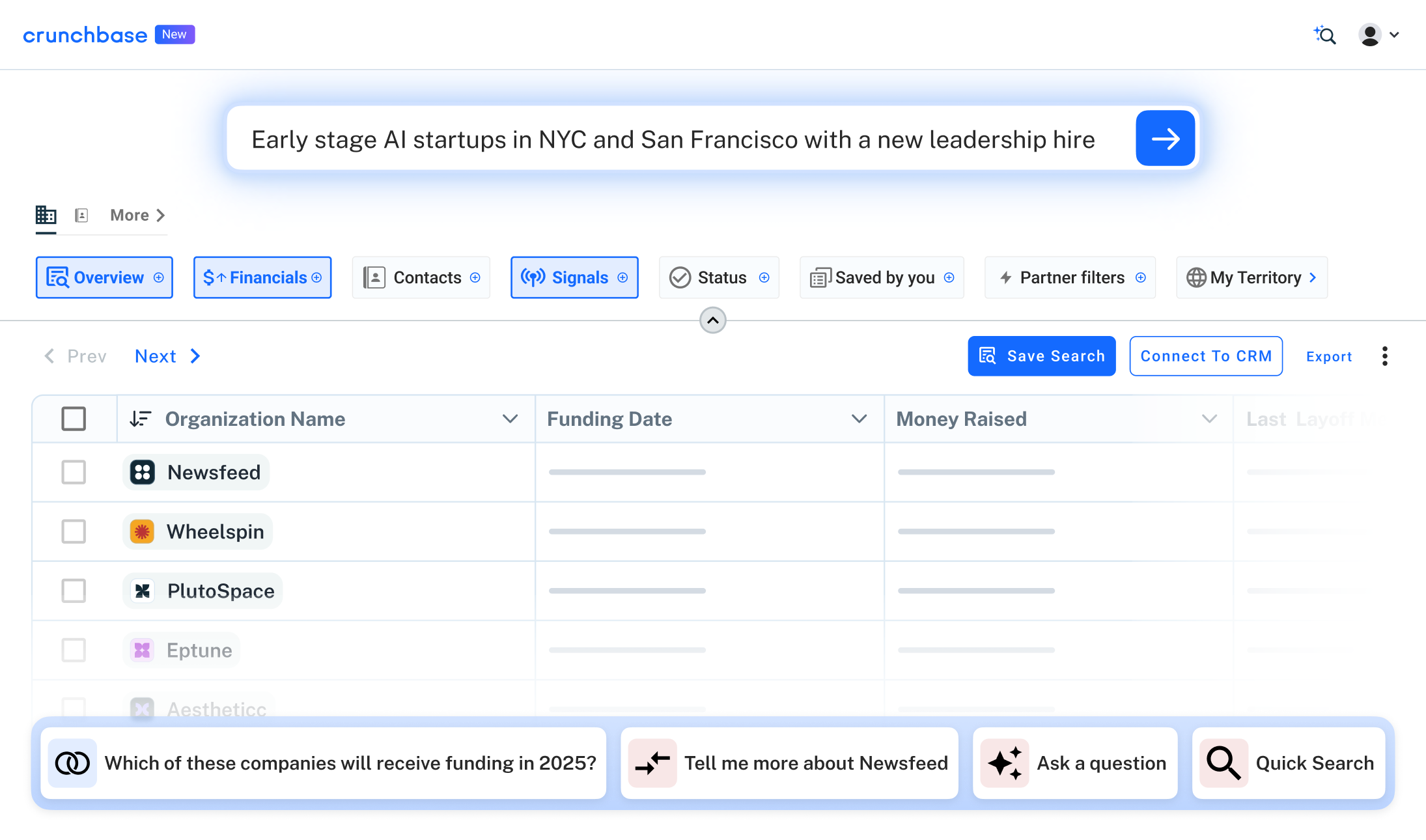Starting a business and building a company is one of the most difficult things you can ever do.
It’s one of those pursuits in life, very similar to aiming to play professional football or basketball, where even if you execute flawlessly, success still isn’t guaranteed. There’s a bit of luck involved. A bit of “right place, right time.” But most of all, it really asks you, the founder, to stay committed through all the ups and downs.
Build your entrepreneurial toolkit with Crunchbase Pro – try it free.
I have dozens of stories from my own journey as an entrepreneur in my book, All In. Over the past few decades building a handful of different startups (and also investing in founders and their businesses), I’ve learned that success is heavily dependent upon how well you have to know who you’re truly selling to, how scalable your processes are, and what’s going to interest them enough to spend money with you—as opposed to someone else.
4 Things You Must Know When Learning How to Start a Business
Here are the aspects of your business you absolutely need to have clarity around in order to build a startup that’s positioned for success over the long term:
1. Create a Multi-Pronged Business Strategy
When it comes to finding your footing in marketing, there are so many things to be mindful of.
Let’s start with geography. While your business can start in a specific city, town, or state, having the ability to repeat the same processes over and over again will not only help your business grow faster, but it will help protect against copy-cat competitors (or anyone who tries to do what you do, better). This is ultimately how you scale, fast. Maybe your goal is to have one small location with no online store. But if it’s not, then you should always be asking the question, “Where else would this business make sense?”
Build a Scalable Business
In addition, one of the big problems businesses make is they build what works for their team of five people—not what’s going to work for dozens, if not hundreds of employees, targeting the same types of customers in various regions around the country (or world). From the very beginning, I encourage you to build internal processes that someone brand new could step into, learn, and execute well. And any time you find yourself doing any action that only you know how to do, stop yourself. Then ask the question, “How would I teach this to the next person?” If you can’t teach it, it’s not scalable.
Ensure Your Customer Base Is Big Enough
Next, are the customers.
I have seen so many businesses fail because their new company was launched for the sake of one, or only a few, customers. But customer concentration can crush your business overnight. You need to make sure that what you’re selling is something a lot of people want—not just a few people in your network or neighborhood.
Remember, even Facebook started as an extremely concentrated idea. At first, their mission was to connect kids on college campuses (and only a few college campuses to start). So when you’re first gathering information about customers in your immediate vicinity, ask yourself, “How many other people in the world would share this same customer profile?”
Think about how to start a business if you were a restaurant with only two or three entree choices. I am really big on getting as much of a client’s wallet share as possible. So, make sure you aren’t just scaling vertically (deeper into one specific offering), but horizontally as well (multiple offerings). Especially in the beginning, this is extremely difficult to execute. For every new product or service, you’re going to have new processes, new customer profiles, etc. Which means you’re really going to have to ask how fast you want to move, and how badly you want to build a successful business.

2. Avoid Hiring Too Many, or Too Few, People
One of the biggest mistakes founders who start a business is hiring too many people. They hire for roles within the company that could be easily outsourced.
They think they need a full-time accountant, a personal assistant, or even a sales director or head of marketing, and so they inherit the costs that come with that sort of hire. It’s not until the startup begins to carry that new cost for a few months that the founder realizes how bloated his or her admin expenses have become.
This is one of the most common challenges startups face and is also the one variable that can suck cash out of a company faster than anything else. People are a big investment, and unless you hire the right people at the right times, that investment can quickly become a heavy cost. Instead, you should always be asking yourself if the role you’re about to hire for is a full-time hire or a task that can be outsourced. Accounting can be outsourced. A personal assistant can be outsourced to a virtual assistant. Even sales teams are being outsourced now. Before you hire someone full-time in the house, you need to ask if your startup is ready to make that sort of financial commitment.
Analyze Exactly What the Hire Will Be Doing
Lastly, it’s always worth questioning whether you have total clarity around the role you are hiring for. The responsibilities should be outlined and clear. Sometimes, it’s actually better to outsource a task first. Then you can get a better sense of what it is that individual will need to do in their respective role. I find most people make preemptive hires out of a lack of understanding of what that person will actually be doing with their time. For example, you might think you need a full-time accountant for your business, only to realize how little there is to “do” in that role by outsourcing those tasks by the hour.
3. Build a Clear and Defined Business Plan
New founders are notorious for living by the business cliché, “If we build it, they will come.”
This is where I see so many inexperienced entrepreneurs fail the most. They have an idea, but it’s not fully thought out—yet they choose to run down the path regardless. Of course, there is something to be said for learning as you go. Learning how to start a business is more than just thinking through the idea. But it’s also important to have some idea of where it is you’re going. You don’t want to head into a battle you’ll never win.
Understand Your Customers’ Pain Points
There are two questions here you need to be able to answer clearly from the beginning of starting a business:
Question number one is, “Who is my customer and what is the pain point I am solving for them here?” A lot of founders like to approach startups backward. They come up with an idea they think sounds great. Then they invent their own problem to say their big, flashy idea is solving. Question what real-world problem you’re solving and who is currently dealing with that problem. The second question is, “Will my target customers be willing to pay for this solution—and if so, how much?”
There are a lot of problems to solve in the world, but that doesn’t mean people are willing to pay for solutions to all of them.
4. Prepare Yourself to Go All-In
Understanding the logistics of how to start a business is distinct from the mental leap it takes to be a founder. As I like to tell all the young entrepreneurs I mentor, “Are you willing to go all in?”
Entrepreneurship is demanding in ways other pursuits in life are not. As Mark Cuban likes to say, “You have to work like there is someone else working 24 hours a day, 7 days a week to take it all away from you.”
I’m watching my son go through this right now, launching his first company, AGreen Farms—an indoor vertical hydroponic farm that can provide same-day local deliveries for microgreens, specialty herbs, and edible flowers in Philadelphia, or can ship the product overnight to anywhere in the country by adding a refrigerated liner to the shipping carton. This is definitely an all-in business!
Starting a Business Is a Game of Endurance
That’s because building a startup is a game of endurance. It doesn’t happen overnight. The first 12-18 months come with a brutal learning curve most new founders struggle to make it through. Some startups turn profitable earlier than others, and some are better poised for bigger exits than their counterparts. Regardless of which direction your startup journey takes you, it’s important to prepare yourself mentally for a demanding road of seemingly insurmountable obstacles—“seemingly” being the key word, of course.
How to start a business is not simple. But what I can tell you, from one founder to another, is that it’s all worth it in the end. Whether you end up hitting a financial “home run” with your first, second, or tenth business, what matters is that you went on the adventure and came out the other side far more knowledgeable than when you began. Founders are a different sort of breed. Once you’ve started your own company, you are forever changed—and professionally, you have a level of experience very few people ever acquire for themselves.
Bill Green is the author of “ALL IN: 101 Real Life Business Lessons for Emerging Entrepreneurs” (bgreenauthor.com). He is also the founder and CEO of The Crestar Group of Companies and LendingOne. LendingOne provides real estate bridge loans to non-owner occupied real estate investment properties. Prior to forming Crestar in 2003, Mr. Green was with Interline Brands since founding the company in 1977. For twenty-five years he led Interline as its CEO from a small retail outlet to one of the largest industrial distribution companies in the country. Today, Interline Brands is owned by The Home Depot.
.svg)




.png)
.png)

